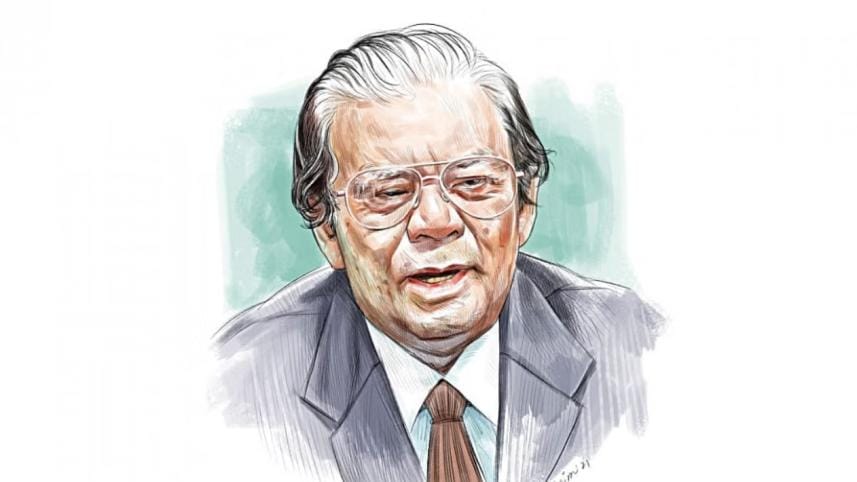Kaus Mia: a role model in a nation where tax noncompliance is rife

Kaus Mia had no posh office like those running conglomerates from their comfortable chambers in the capital's Gulshan, Banani and Motijheel areas. A room in the Hakimpuri Zarda factory on Aga Nawab Dewri Road in Old Dhaka was his beloved chamber from where he led his business empire and became a top taxpayer in Bangladesh.
He was born on August 26, 1931, in Chandpur, but his ancestors were the residents of the state of Tripura in undivided India. He passed the eighth grade in 1945 before dropping out.
His father did not want him to get involved in business but since he was obsessed with it, he took Tk 2,500 from his mother and started his grocery trading in Chandpur's old market in 1950. This marked the beginning of a long journey for the 19-year-old.
Soon Kaus Mia became an agent of 18 brands of cigarettes, biscuits and soaps. For the next 20 years, he ran operations from Chandpur. He moved to Narayanganj in 1970 and started a tobacco business.
From the tobacco business, the idea of producing zarda (scented tobacco) came to his mind.
Kaus Mia launched Shantipuri Zarda in 1976 but it was counterfeited. In 1996, he rolled out Hakimpuri Zarda, which went on to become a household name.
Until his death yesterday at the age of 94, the proprietor of Kaus Chemical Works ran 40 to 45 types of businesses. He owned assets worth Tk 10,000 crore, said the entrepreneur in an interview in 2016.
Apart from the Hakimpuri Zarda, it was his obsession to pay taxes regularly and retain the spot as a top taxpayer that helped him gain more prominence nationally.
The successful businessman had been one of the highest taxpayers in Bangladesh since 2010-2011. It sharply contradicted the tax payments attitude in a country where tax evasion and dodging are rife, and the tax-to-GDP ratio is one of the lowest in the world. The International Monetary Fund also said there is much scope for further revenue mobilisation in the country.
He said it was patriotism and responsibility that led him to pay taxes for so many years.
"I have been paying taxes regularly since 1958. Paying taxes is a responsibility, not a legal obligation."
When people asked him why he was so passionate about paying taxes, he replied, "I pay tax as I make profits."
"Paying tax is a good thing. How will the state bear its expenses if we don't pay tax? If you pay tax, the money is white. I can do whatever I want," he said in interviews.
Kaus Mia became the epitome of tax compliance after the National Board of Revenue (NBR) introduced tax cards to honour top taxpayers and encourage compliance. He was celebrated as the best taxpayer in the Mujib Borsho, which marked the birth centenary of Bangabandhu Sheikh Mujibur Rahman.
Sharing his experiences, Shakil Ahmed, the tax adviser of the businessman, said in 2021 that the total tax of Mia came to Tk 99 lakh in one year. Mia suggested making it Tk 1 crore so that it made sense.
"He is ready to pay higher, if necessary," said Ahmed, a lawyer of the Supreme Court. He had looked after the tax issues of Mia and his business for 40 years.
Professor Mustafizur Rahman, a distinguished fellow of the Centre for Policy Dialogue, said: "Kaus Mia is an exception in a country where there is reluctance among many people to pay taxes and many do not pay tax even after having taxable income."
"He has set a good example and become a role model for many. Many people have been inspired by him."
Muhammad Abdul Mazid, a former chairman of the NBR, said many employ tricks to evade taxes whereas Kaus Mia had been the exact opposite.
Apurba Kanti Das, a former member for income tax of the NBR, said the number of people who pay taxes voluntarily is low.
"I have seen many people and businessmen who feel joy in not paying taxes. As a result, it has not been possible for the NBR to bring all businesspeople under the tax net and raise collections to the expected level."
Kaus Mia had been suffering from old-age complications and breathed his last at the Asgar Ali Hospital, Anowar Sadat, a grandson of the businessman, told The Daily Star. He left behind his wife, eight sons and eight daughters.




 For all latest news, follow The Daily Star's Google News channel.
For all latest news, follow The Daily Star's Google News channel.
Comments